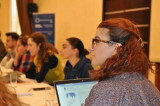News & events
Armenia's path to beneficial ownership transparency and data use
01.11.2022

In recent years, Armenia has been committed to being open about the individuals who own companies operating in the country. In 2020, Armenia EITI began publishing beneficial ownership data for extractive companies, and the government established an online register the following year. Having refined its definition of beneficial ownership, the Armenian government is set to publish beneficial ownership data across all economic sectors, and to improve the quality and accessibility of data by publishing it in a standard, open and machine-readable format, albeit only on an individual, per-record basis, rather than a bulk dataset. Despite recent political unrest, the government, civil society and industry have been keen to make progress in ownership transparency.
Building on this momentum, the Opening Extractives programme facilitated a two-day workshop in the outskirts of Yerevan on using beneficial ownership data for investigative reporting and advocacy. In collaboration with the Freedom of Information Center of Armenia (FOICA), civil society groups and journalists shared skills, tools and methodologies to analyse and use beneficial ownership disclosures and improve public oversight of natural resource governance in Armenia.
The first day of the workshop kicked off with a presentation from the Ministry of Justice of Armenia to introduce Armenia’s state of play regarding beneficial ownership regulations, systems and obligations. The session was followed by a Q&A session with participants and proceeded by a training on company declaration forms, presented by respected journalists and trainers Mkrtich Karapetyan and Ani Grigoryan, from CivilNet.
Louise Russell-Prywata, Policy Director at Open Ownership, provided an overview of the state of play of beneficial ownership transparency globally, and presented cases studies on uses of beneficial ownership in European countries. She stressed the importance of global, linkable beneficial ownership data, as this cross-border problem needs to be tackled transnationally.
Finally, Kristine Aghalaryan of Hetq, a network of investigative journalists, facilitated a masterclass on how to conduct investigating research, where participants learned to link and verify different data sources available in Armenia, build relationships with informants and report engaging stories.
Some of the challenges journalists mentioned during the workshop were that beneficial ownership information was not downloadable in bulk which causes obstacles for analysis and verification of data. Another challenge flagged was payment of fees to access the various websites which made their work difficult and costly. Representatives from the the State Registry, which maintains the beneficial ownership register, engaged positively with these issues, and civil society and journalists ensured their willingness to work with government on follow up actions on analysing beneficial ownership data. The Ministry of Justice representatives committed to evaluating alternatives to improve the ease with which journalists can access the data.
On the second day, representatives from CivilNet, an online television and media source with a focus on human rights and democracy in Armenia, discussed available data sources and how the data can be used. Participants drew on existing databases – such as Armenia’s elections registry and the national procurement system, as well as information from public financial disclosures and assets declarations, contracts and sanctioned companies – and pitched ideas on using beneficial ownership data for research and advocacy projects. Ideas discussed among participants include investigating the true owners of the Armenian media centres and TV stations, looking into health reforms and procurement processes, assessing conflicts of interest in the land and hydroelectric sell process, and addressing irregularities in the mining sector through beneficial ownership transparency.
Finally, Lusine Torosyan, National Coordinator of Armenia EITI, showcased Armenia EITI’s disclosures of beneficial ownership and other EITI related data, while Louise Russell-Prywata introduced the Open Ownership Register. The Opening Extractives programme will continue to support Armenia in its efforts towards beneficial ownership transparency and data use, and will look to Armenia to pioneer good practices in the coming years.
As next steps, the programme will follow up on the work of investigative journalists and civil society representatives on the five selected mentorship beneficial ownership data use projects which will be supported by the Opening Extractives programme in partnership with Freedom of Information Center of Armenia (FOICA).
Source: www.eiti.org